Learning Tips for the 16 MBTI Types
Everyone is different, and therefore we learn differently too.
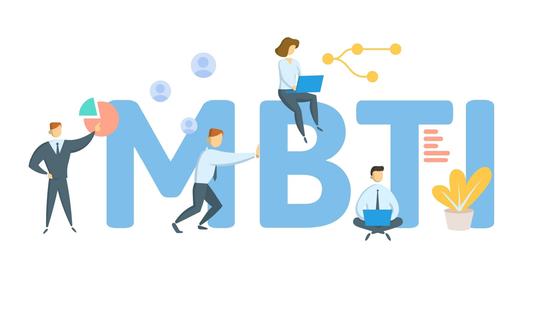
But have you ever tried structuring your learning and selecting appropriate methods based on your MBTI personality type, rather than your preferences and feelings? No? Then this article is for you! We have analyzed all 16 personality types and offered some tips and directions on how you can try to increase your educational effectiveness.
If you still don't know, MBTI is one of the most popular psychological tests, which is deciphered as "Myers-Briggs Type Indicator" and is based on the principles and works of the famous Swiss psychiatrist Carl Jung. A few years ago, the test gained incredible fame on the internet! Since then, you may even be asked in an interview what personality type you belong to, as this test is considered one of the most accurate psychological tests in the world. It classifies people into 16 types depending on their perception, communication style and decision-making, emotional spectrum, various behavioral habits, etc. According to this test, it is our personality type that determines what work we enjoy the most and what role we play in society.
The idea of MBTI consists of four pairs of characteristics that are opposite to each other, which in different combinations add up to give 16 types:
-
Extroversion (E) - Introversion (I). Extroverts are the type of people who restore internal resources through communication and being in society, while introverts do so in silence and solitude.
-
Sensing (S) - Intuition (N). The first type focuses on facts when making decisions and choices, while the second focuses on a worldview.
-
Thinking (T) - Feeling (F). Thinkers proceed from logic, while feelers proceed from emotions.
-
Judging (J) - Perceiving (P). The first type tends to plan, while the second tends to spontaneity.
Depending on how these characteristics are combined in your case, one of the sixteen types will result. If you still don't know which type prevails in you, we suggest taking the test on the official 16Personalities website and finding out! Then look for yourself below and see what the experts at Lectera advise your type of student.
ENFJ - The Protagonist: Learning in Company and Active Activity

ENFJs achieve the highest results when they learn in a group or through interactive formats, where it is possible to establish social connections and demonstrate cooperation skills (naturally high in ENFJs). This type likes to take initiative in projects and, for example, help others absorb the material, which can be used to consolidate it after reading. Role-playing games, field experiments and research, playing out various scenarios - all these are also active learning methods that are suitable for ENFJs.
When choosing courses or an environment for learning, ENFJs should rely on how engaging the mentor or teacher's tools are and whether it will be possible to work in a team or at least in a pair. For ENFJs, an open dialogue, the ability to receive feedback and share thoughts are vital for maximizing knowledge. It is very important to look for connections with like-minded people or the same students, as it is important for ENFJs to feel equal in the context of education. The student-teacher relationship will not give the same profit.
Conclusions:
-
Try brainstorming and group games for memorization or decision making
-
Study exclusively in a group and participate in team projects
-
Involve role-playing games and research work in the learning process
INFJ - The Advocate: Reflective and Long-Term Learning
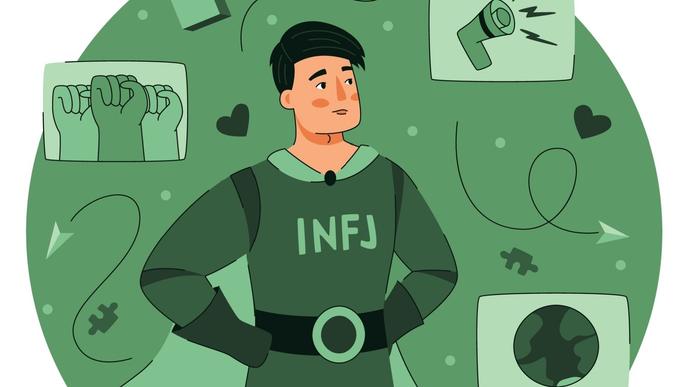
INFJs are a highly intuitive type, which values measuredness, deep immersion, and the opportunity to reflect in silence, read, and explore the issue from different aspects independently. The best approach for this type is individual mentoring, where the INFJ will always have a person to approach with a question, and where there will be a safe and supportive environment without competition or spectators.
INFJs always strive for deep understanding and building relationships, so reflective exercises aimed at processing and structuring information are well suited. It is also recommended to keep a diary, meditate in between learning, establish a trusting relationship with one single mentor, and use mainly literature or podcasts as a source.
Conclusions:
-
Engage in thoughtful reading and reflective writing (for example, when you need to absorb the material)
-
Find a mentor who will create a personalized learning plan for you
-
Read more and try to find such training that also corresponds to your philosophical and personal values
INTJ - The Architect: Structured Learning and Analytics

INTJs are primarily logicians, so analysis and a clear structure are important to them. They will not be able to absorb information if they do not first break it down into categories, so it is very important to use diagrams to organize knowledge and plan learning. They are best at skills based on consistency, for example, programming or any complex concepts.
To achieve maximum results in learning, INTJs need step-by-step guides - find them or create them yourself! Exercises where you need to analyze or solve specific problems (tasks, equations, etc.) are also suitable. INTJs will also like research projects - the main thing is that they do not depend on the team or mentor and can study the problem as deeply and in the order that they deem necessary. Consequently, INTJs need freedom of learning and a focus on theory. This is not the type of person who will be satisfied with purely practice in its raw form, they need to satisfy their curiosity and learn.
Conclusions:
-
Systematize any information and organize it correctly, use diagrams, templates, diaries, planners, etc.
-
Learn independently with a focus on research activities and case solving
-
Focus on theory, it stimulates your development and helps maintain motivation, since you will definitely find it interesting
ENTJ - The Commander: Strategic and Competitive Learning

ENTJs are leaders and strategists in one package, who need a competitive environment in order not to lose motivation. It is also important for them to take responsibility, so participation in projects, participation in discussions and the same tools as the ENFJ type are suitable, with one exception: the ENTJ wants to be a leader, not an equal participant. They need to coordinate all the work and be responsible for others, and then learning will go like clockwork.
Thus, in order to increase their educational effectiveness, ENTJs need to have the opportunity to make independent decisions. Participate in competitions and create an educational strategy for the entire team, form goals and a plan to achieve them. Given this, it is better to give preference to group offline classes, where you can coordinate teamwork. The use of various ratings, point assignment systems and games, where the ENTJ will be able to compete for first place (for example, as the best expert in the material covered), will also help.
Conclusions:
-
Take on a leadership role in group educational projects
-
Involve strategic planning and your passion for competition
-
Use simulations, role-playing games and competitions to practice your knowledge in practice (online is also suitable)
ENFP - The Campaigner: Creative Learning and Spontaneous Decisions

ENFPs are incredibly creative, so they demonstrate extremely high results only in those conditions in which they can turn on their imagination to the fullest. Generating ideas, creative workshops and laboratories, interactive formats using innovative technologies (for example, virtual reality), inconsistent learning and artistic elements - all this is ideal for ENFPs.
Ideally, they should not have a clear plan, but they should have tools to optimize learning, namely a large variety of materials, online tools and the ability to study them as they please. Colorful mind maps, VR-laboratory, role-playing game with a bias in acting, memorization through associative series and visualization are also suitable. What is definitely taboo for ENFPs is a rigid schedule, cramming, classic classroom sessions and formulas and exercises.
Conclusions:
-
Participate in workshops and interactive sessions where you need to generate ideas or independently explore a problem using creative approaches
-
Focus not on how you will learn, but on what you need to learn, and use your favorite creative tools, even drawing or versification
-
Study either alone or in pairs, but not in large groups, where there will be no time and space to demonstrate your creativity (it is very important for ENFPs to demonstrate their knowledge and successes!)
INFP - The Mediator: Introspective Narrative Learning

INFPs learn best when they feel a personal connection with the educational material, that is, they can analyze its content, tell someone about it, or associate themselves with it. That is why INFPs are best at history and literature, that is, such sciences that have a specific value and meaningful content, and not abstract, as in mathematics or physics.
Thus, keeping a diary, creative writing, participating in thematic debates and open discussions, exploring the problem through philosophical reflections, thoughts and feelings is suitable for INFPs. If INFPs can integrate personal experience into the topic at the same time - that's ideal! Or vice versa, turn a new skill into an experience by trying it in practice or linking it to other skills or a specific situation.
Conclusions:
-
Try retelling the material you have studied and use storytelling skills for memorization and work
-
Keep a diary and record not only useful information in the process, but also thoughts, a balance between creativity and systematization is important (rigid schemes are not suitable for you)
-
Find like-minded people and participate in live discussions on forums, online or in person, and also find points of contact with new topics (where have you already encountered this? Where have you used it, possibly even without realizing it?)
INTP - The Logician: Theoretical and Independent Learning

The motto of INTPs is "The more difficult, the more interesting!". If they find a topic that no one before them could understand, then with a high probability they will be the first to figure it out. They also love theoretical material that you have to think about and first break it down into categories, so complex projects with many challenges are perfect for them, requiring deep research and critical analysis.
At the same time, effective learning for INTPs requires not solitude at all, as one might think, but a communicative and responsive environment that encourages debates, questions and even disputes, since INTPs are among those people who believe that "truth is born in a dispute." They love it when they are explained and proved, and the opportunity to make a mistake (especially when they really made a mistake) only ignites their curiosity and thirst for knowledge. Consequently, conferences, group classes and research projects are perfect.
Conclusions:
-
Look for complex solutions and try to go from "complex to simple," and not vice versa, because when it's too simple, you quickly lose interest (or just speed up your learning)
-
Look for an environment consisting of people close to your type, who are also active researchers and are ready to argue, analyze, find out
-
Communicate with niche experts who you consider smarter than you, and borrow complex author's approaches and methods
ENTP - The Debater: Dynamic and Innovative Learning
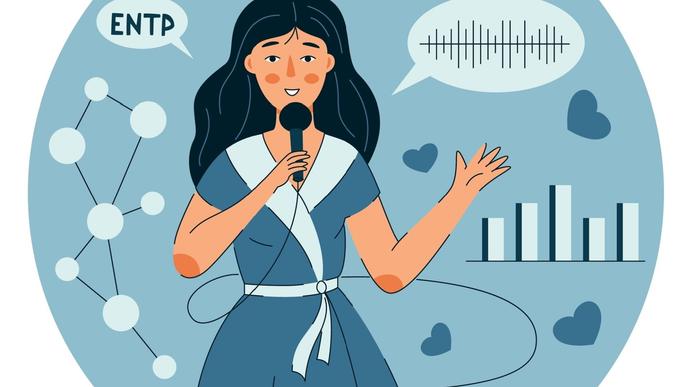
ENTPs are masters of adaptation, who feel in a changeable and unpredictable environment like fish in water. In short, what is stress for others is fertile ground for them. As is clear from the name of the type, ENTPs are natural extroverts, they learn best through discussions and debates, enjoying the process of collective problem-solving and brainstorming. In their educational habits, this type borrows features from ENFJs and ENFPs.
In order to realize their educational potential to the maximum, involve your environment, namely attend mass events and take on the role of an informal leader of the team. It is suitable to include elements of competitive struggle in learning, for example, breaking the group into several teams or issuing rewards, competitions with incentives, ranks, etc. The main thing is that the competition is exactly playful, and not oppressive (a softer version than what the ENFP type needs).
Conclusions:
-
Communicate as much as possible in the process of discussion: share guesses and ideas, explain (try to act as a mentor), challenge and discuss publicly or write posts, publications, new educational materials.
-
Use the brainstorming technique and other idea generation techniques where it is required to find a solution to any problem
-
Organize competitions or various tests for yourself and your environment to create a near-competitive environment
ESFP - The Entertainer: Practical and Leading Learning

As performers, ESFPs need active and practice-oriented activities, it is difficult for them to sit still and just study and read the material. Instead, they need to interact with it, for example, using applications and technologies instead of traditional learning methods. You can use both role-playing games with active participation, and use your organizational skills in learning, namely organize a training event for yourself and your environment. For example, a debate or a conference.
To increase their educational effectiveness, ESFPs need sensory involvement, namely movement and interaction, for example, master classes, demonstrations, excursions, games. For this reason, passive learning is also suitable for them, for example, listening to a podcast while cooking, etc., so as not to have to focus on just one theory, which quickly kills the motivation of ESFPs.
Conclusions:
-
Not just participate, but organize educational events, for example, flash mobs, model UN games, conferences, etc.
-
Learn in motion continuously, for example, with Lectera courses, thanks to which you will satisfy your need for practice and speed.
-
Involve interactive elements and technologies to engage in the educational process, and if you get bored, switch attention to another topic - ESFPs cannot allow boredom!
ISFP - The Adventurer: Expressive and Visual Learning
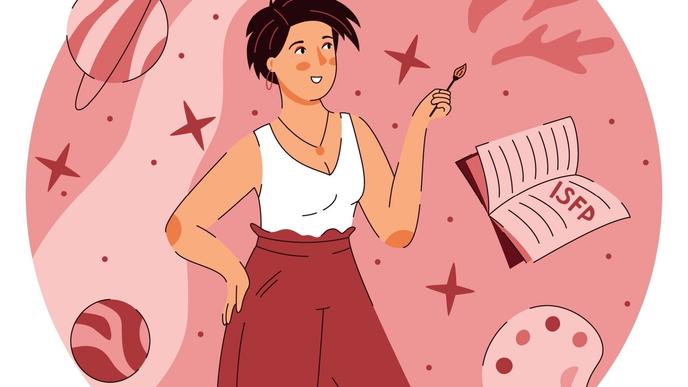
For success, ISFPs need sensory impressions, and therefore a creative artistic environment with appropriate visualization tools. Simply put, if there is no visual example, a clear and bright diagram, and ideally a whole illustrated brochure with a detailed guide in front of the ISFP, then they will not understand. Video guides on YouTube or photo cards with a sequence of actions are best suited to representatives of this type. The ISFP simply will not have the patience to understand dry text, where there are only letters. Thoughtful and in-depth analysis is not for them - it needs to be fast and as simple as possible.
At the same time, ISFPs need spectators or partners, because they are artists. It is good if they have a team of like-minded people, interaction with whom is not regular, but with whom you can discuss something. Thematic communities and forums are suitable here, which you can visit from time to time to maintain your interest in learning. Personal attachment to the educational material (just participating in some thematic chat, for example) will greatly help the ISFP.
Conclusions:
-
Use visual materials and practical guides, and if there are none, create them yourself using collages, drawings, etc.
-
Join thematic communities and groups where you can find like-minded people to find a point of intersection between your educational interests and personal ones
-
If some topic or skill is not given to you, try to break it down into stages and visualize them or ask a friend to show you clearly!
ISTP - The Virtuoso: Analytical and Practical Learning
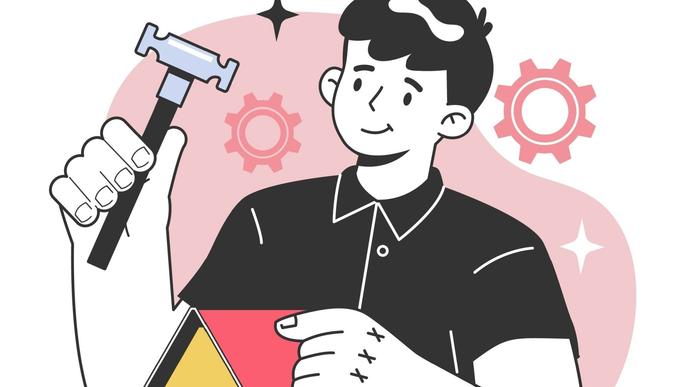
Unlike the previous type, ISTPs prefer to learn independently, visualization is also important for them, but from the point of view that the area or thing of interest can be "disassembled into details and looked at what is inside." That is why they should give preference to various laboratories and workshops, or take on projects related to working out specific situations, creating prototypes, etc. For example, on a design course for ISTPs, it will be useful to volunteer to provide a visual sample of such an element by the next lesson or develop a website design from scratch, alone. Diagrams, models, demonstrations are the best friends of ISTPs.
At the same time, they have problems with asking for help, and they also have problems with long-term concentration, especially when it comes to text or lecture, listening to audio, etc. If this learning method is still necessary due to the specifics of the activity or the chosen course, it is recommended to alternate them with practice and modeling. This will help maintain interest.
Conclusions:
-
The sooner you start applying the knowledge gained in practice, the better, refuse theory in favor of practice (if possible)
-
Choose independent learning in groups, accept challenges and tasks
-
Alternate periods of prolonged concentration with fine motor skills or modeling or with ordinary rest in order not to quickly burn out
ESTP - The Entrepreneur: Fast and Competitive Learning

ESTPs are the very type that Lectera courses are ideal for! They need fast and as concise knowledge as possible, pump skills through practical experience and love competition and social interaction. To maximize their potential, they also need constant feedback, which means a mentor: to point out what is wrong, notice mistakes (ESTPs are often impulsive and do not pay attention to them), give advice and, most importantly, cheer them up, because emotional support is also important for ESTPs.
It is very important that the learning of the ESTP is not devoid of spontaneity. When, for example, today you are learning this, and tomorrow something completely different. Their worst enemy is routine and long-term projects that are scheduled by the hour, which means predictable. In such conditions, the motivation of the ESTP quickly dies.
Conclusions:
-
Participate in fast and competitive events, actively get involved in various challenges and competitions
-
Use applications and services for the practical application of knowledge, or Lectera courses, where practical knowledge is already built-in
-
Do not follow rigid schedules and plans, switch sometimes between topics and allow yourself to learn spontaneously (for example, change geolocation, study in a park or cafe)
Lectera’s Online Courses by topic
ESFJ - The Consul: Structured and Collaborative Learning

ESFJs need structured guides and collaborative tasks. When they find themselves left to their own devices, they often panic or immediately lose all confidence. They need a group to succeed, where there will be mutual support and at the same time provide a sense of unity and community when faced with any educational problem. In simple terms, group classes in the classroom are your choice!
When choosing tools, ESFJs should also give preference to classical tools, for example, textbooks, manuals, tests, etc. They will be well suited to the school curriculum and school methods with a balance of personal interaction with the community to practice knowledge in practice.
Conclusions:
-
Attend classical lectures and seminars in a group, participate in group projects to practice knowledge
-
Use clear guides and structured educational materials, in which there is a minimum of extra (pictures, fonts) and a maximum of systematization (for example, tables)
-
Minimize competition - you need a supportive and calm environment for learning
ISFJ - The Defender: Detailed Learning with Repetition
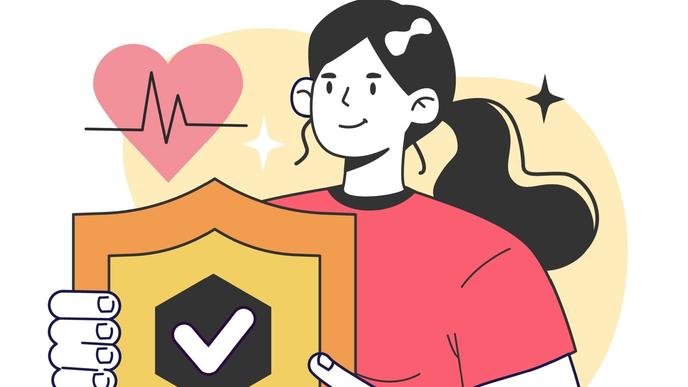
ISFJs are a bit slow when it comes to learning, so the more detail, the better for them. A step-by-step approach to learning according to the classical system "from simple to complex" and traditional methods, for example, rewriting text, cramming, systematic repetition (for example, according to the Ebbinghaus system), etc., are also important. When getting acquainted with a new topic, ISFJs need to focus on making it as clear and detailed as possible for themselves.
Collect handouts, set aside time for repetition during the week and before classes, and always keep auxiliary materials at hand and actively take notes or drafts. ISFJs will also be helped by making notes and records in the learning process, since memory may be a weak point of this type.
Conclusions:
-
Do not avoid traditional and "boring" methods such as interval repetition and speaking aloud
-
Actively take notes, keep records, diaries, evaluate your progress
-
Work on memory and try innovative memorization techniques, for example, mnemonics
ISTJ - The Logistician: Systematic and Ordered Learning

ISTJs value order, stability and predictability, as well as accountability. It is important for them to constantly track their progress and record the results in order to maintain motivation, for example, keep a diary and even set marks for themselves (why not?). They, like the previous types, are well suited to traditional methods such as lectures and multiple-choice tests aimed at memorizing the material.
The weak point of the ISTJ is practice, since they often pay insufficient attention to it and, as a result, accumulate exclusively theoretical knowledge. That is why it is important to "pull" yourself out of your comfort zone and participate in research projects, even if it is difficult at first. ISTJs are mostly independent, but group work helps them control stress and not take on too much (this type is often workaholics).
Conclusions:
-
Use a self-assessment system and track your progress, but at the same time be sure to encourage yourself for any achievements (develop a special system for this!)
-
Use structured and predictable environments and tools with low internal competition
-
Structure your learning using goal-setting techniques, for example, a roadmap or SMART
ESTJ - The Executive: Goal-Oriented and Effective Learning
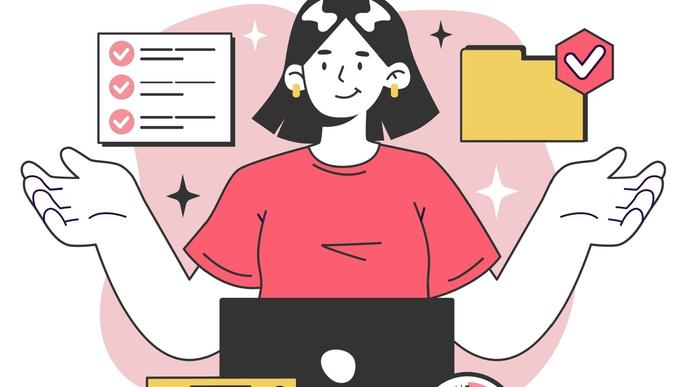
ESTJs are very similar to the ENTJ and ESFP types. They are also focused on self-organization of the process and like to lead groups or entire communities, and therefore learn through the roles of leaders and methods that are more characteristic of corporate life than for educational. For example, all sorts of time management techniques, team management like Agile and everything that they have long studied in the office, they can also effectively transfer to education. And it's worth it!
So, in order to get the most out of training, ESTJs need to choose flexible training formats with group activities, where they can adjust the educational process, based on their current needs, and at the same time will not only have the opportunity to lead the rest, but also maneuver. The thing is that ESTJs often have a very tight and busy work schedule, so it is very important to work not only on skills, but also on preventing emotional burnout.
Conclusions:
-
Take a leadership role in communities, for example, act as a mentor for a beginner or explain the material covered to loved ones
-
Track your progress with mobile applications or tables and encourage yourself for success
-
Leave free "windows" in the schedule for personal matters and spontaneous learning, when you suddenly have a suitable mood for this or a need
Do not forget that the truth of these types has not been proven scientifically, and although many psychologists and even HR managers are guided by it, this does not mean that, for example, ESFJ methods will not suit you if you are an ENFJ, and vice versa. Each person is unique, the main thing is not to be afraid to experiment with your training if you feel that you can optimize your effectiveness. You can always try Lectera's quick courses, developed on the basis of the innovative Fast Education methodology - here every MBTI type will find something for themselves!
Share this with your friends via:
Latest News

In the UK, £23 million has been allocated for the expansion of the EdTech Testbed program — pilots of educational technologies in schools and colleges.

In the US, Tuskegee University announced the launch of Tuskegee University Global Campus (TUGC) — a new online platform for distance learning.

A significant stage in the development of the alternative education system has begun in West Northamptonshire in the UK: the County Council is actively calling on parents, guardians, and trustees to participate in shaping the future of this key area.

Outwoods Primary School in Atherstone, Warwickshire, having experienced deep sadness after the loss of their famous cat, Silla, has found solace in a new pet – a Maine Coon named Aloysius O’Hara.

In modern universities, artificial intelligence, and in particular ChatGPT, is rapidly transforming from a controversial tool into a full-fledged student assistant.












 Spring skills audit: what to remove, strengthen, and “sow” in learning
Spring skills audit: what to remove, strengthen, and “sow” in learning
 9 Career Mistakes Young Professionals Make
9 Career Mistakes Young Professionals Make
 £23 million allocated for the expansion of EdTech Testbed in the UK
£23 million allocated for the expansion of EdTech Testbed in the UK
 Test: How Psychologically Mature Are You? Check Your Inner Foundation.
Test: How Psychologically Mature Are You? Check Your Inner Foundation.
 Test. Check Your Social Media Dependency Level!
Test. Check Your Social Media Dependency Level!
 Test: What Business is Right For You?
Test: What Business is Right For You?
